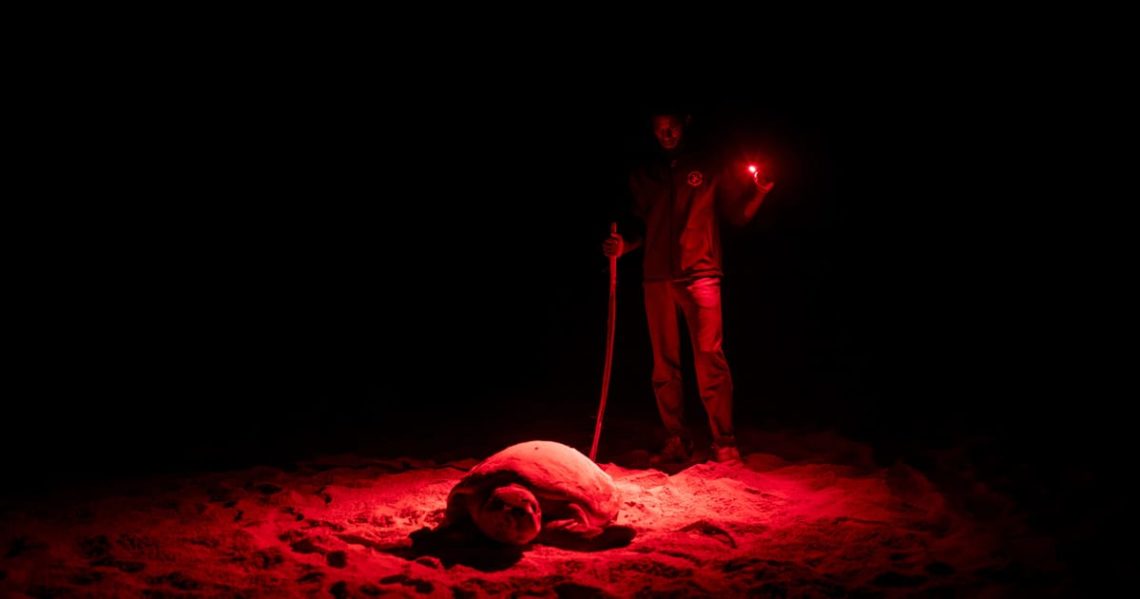OPTICS
Shortage of sand: Europe’s impact on Cape Verde’s turtle crisis
Plastic pollution, mass tourism, climate change and poaching all put pressure on a fragile ecosystem, revealing how local challenges often stem from global problems.
Text and photos by LUIGI AVANTAGGIATOin Boa Vista, Cape Verde
Every summer, thousands of sea turtles climb the beaches of Boa Vista, Cape Verde, for a millennia-old ritual: nesting.
Today, however, this process is threatened by several factors, putting one of the world’s largest Caretta caretta turtle colonies at risk. Poaching, pollution, mass tourism and climate change are all putting pressure on this fragile ecosystem, revealing how local challenges often stem from global problems — with a heavy shadow cast by Europe.
The most significant threat to these turtles is plastic pollution. And here, the fisheries agreements Cape Verde has with the EU — allowing European industrial fleets, especially Spanish and Portuguese, to operate in its waters — have a significant impact on marine life.
Nesting beaches are suffocated by tons of waste carried by currents, mostly originating from fishing activities and dumping along the European and African coasts. The accumulation not only chemically contaminates nests but also creates physical barriers that prevent female turtles from finding safe spots to lay their eggs.
“It’s like looking for a home in a minefield,” explained Franziska Haas, a German biologist and volunteer with Fundação Tartaruga, one of the most active local NGOs. “Often, we have to help them find a safe spot. Some get lost, wander for hours until morning and risk dying of dehydration.”
Fundação Tartaruga currently monitors over 30 kilometers of coastline with teams of rangers and international volunteers, many with scientific training. Their work is crucial for identifying nests, protecting eggs, combating poaching and documenting the growing damage caused by pollution.
There’s plenty more coastline to cover, of course, but their resources are limited.
Then, there’s overtourism. In the last two decades, Cape Verde has become an increasingly popular tourist destination for Europeans. The islands of Sal and Boa Vista, in particular, have seen massive investment from European real estate groups, resulting in the construction of hotels, resorts and residential complexes along turtle-nesting beaches.
But it’s not just the land that’s dangerous, threats to these turtles loom in the water as well. Industrial trawl nets accidentally catch tens of thousands of turtles every year, both in the archipelago and during their migration in the Atlantic and the Mediterranean to feed.
And while European regulations mandate the use of exclusion devices, which allow turtles to escape nets, they’re only mandatory for certain fleets and areas, and enforcement is often inconsistent.
There’s also he impact of climate change to contend with. In many cases, excessive heat causes embryo mortality. Meanwhile, the sex of turtle embryos depends on the temperature of the sand where they lay their eggs, with higher temperatures favoring females. And this growing imbalance could jeopardize long-term reproduction.
In the face of all these threats, the volunteers’ night work has become essential; their observations are silent, meticulous, and almost ritualistic.
Their teams consist of three or four volunteers and an environmental ranger, and their patrols are organized to the rhythm of a metronome, keeping the time dedicated to each female turtle to a minimum. Some of the volunteers help dig deeper holes, some inject microchips for the census, some note the nest’s GPS coordinates, and some come back to evaluate the turtles’ age, size, health and the presence of wounds.
Still, despite all this work, poaching persists on the island too. Despite commitment from Cape Verde’s government, which criminalized the consumption of turtle meat and eggs in 2018, females are caught at night, killed while laying eggs and sold on the black market where meat can fetch up to €20 per kilo.
“Turtles are hunted illegally for their meat and eggs, which are sold by word of mouth,” confirmed Fundação Tartaruga’s Executive Director Euclides Resende. But “in 2024, we documented just six killings on the beaches we monitor, compared to thousands just a few years ago.”
The group’s surveillance work is effective, having adopted an innovative approach that uses conservation dogs and thermal technology in 2019. “This allows us to expand the surveillance range and collect evidence for potential legal action,” explained project coordinator Adilson Monteiro.
But it’s exceedingly difficult to eradicate an activity so deeply rooted in the culture of a place: The meat and eggs of Caretta caretta have always been consumed on the islands. And in inland villages like João Galego, Cabedo do Tarafes and Fundo das Figueira, “Ba pa bela” (catching a turtle) is a true rite of passage.
“For my family, hunting turtles was normal. My grandfather did it, my father did it, and I learned from my older brother. Every family in João Galego has always eaten turtles; it’s part of our tradition,” said tour guide Zenildo F.
It is this difficult coexistence of tradition and environmental conservation, along with the need for further pollution and fisheries regulations, that makes the survival of Cape Verde’s sea turtles a truly global test case.
The post Shortage of sand: Europe’s impact on Cape Verde’s turtle crisis appeared first on Politico.




